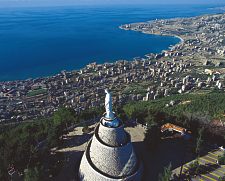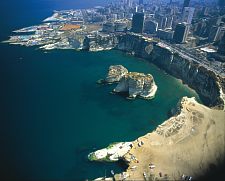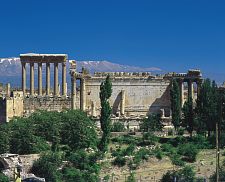|














| |
ROADMAP TO NORMALIZATION
THE CENTER FOR DEMOCRACY IN LEBANON
DECLARATION #5, July 25, 2006
Declaration in PDF
The kidnapping of two Israeli soldiers by Hezbollah on July 12 triggered a wave
of violence in Israel and Lebanon. However, the recent spate of terror is but an
irrevocable testimony to the inaptitude of the United Nations and world leaders
to broker a lasting peace settlement in the Middle East between belligerent
member nations of the United Nations.
The Israeli assault on Lebanon, (July 12 onwards) by air, land and sea, amounts
to a crime against humanity. To set conditions in the face of immediate
ceasefire is to endorse the slaughter of innocent and defenseless civilians in
flagrant violation of basic human rights and international laws, including the
Geneva Convention.
The so-called “resistance movement” led by Hezbollah, an armed group acting
unilaterally, has failed to protect the Lebanese territories from enemy attacks
and their balance of terror strategy became shifted in favor of Israel.
Whereas Lebanon, the people and the government, stand today defenseless against
these attacks as the international community refuses to implement an immediate
and unconditional ceasefire, we propose the following comprehensive roadmap to
normalization:
To United Nations Security Council:
1) Imposing immediate and unconditional cease-fire in Lebanon under the
penalty of sanctions, and launching massive humanitarian and economic relief
efforts for Lebanon
To Israel:
2) Withdrawal to the international borders between Israel and Lebanon (the
blue-line) including the Shebaa Farms and the Hills of Kafarshouba and allowing
immediate and unconditional return of all those forced to flee battle zones to
their homes
To Israel and Hezbollah:
3) Exchange of all Lebanese citizens held prisoners by Israel and Israeli
soldiers captured by Hezbollah
To Hezbollah:
4) Until the Arab-Israeli conflict is resolved, the majority of Lebanese
citizens consider the previous steps (1-3) as acceptable conditions for
returning to the 1949 Armistice agreement between Lebanon and Israel. If
Hezbollah’s aim is in accordance with these conditions, then Hezbollah’s
militants must agree to tender their weaponry to the Lebanese army. In the
absence of prospects to empower the Lebanese army, militants might form a
deterrent force against foreign invaders only through integrating within the
army, in coordination with the Lebanese government. Unifying all Lebanese
arms under a single command and under the flag of the Lebanese army is in our
national interest. The Lebanese Government and the Hezbollah leadership must
begin a serious integration process whereby willing resistance fighters can join
the Lebanese army and all decisions pertaining to military engagement are
consolidated under one command. If, however, Hezbollah insists on the fight
against Israel regardless of these goals and maintains an extra-national agenda
or slogans such as ‘until freeing Palestine’, Hezbollah risks to be considered
as a pariah to the Lebanese community
To the International Community:
5) The deployment of any peacekeeping mission, even if endorsed by the United
Nations and the Lebanese Government, is unlikely to guarantee stability and
peace. The probability of such mission succeeding will only increase with
diplomatic blessing from enemy combatants, which is so far lacking. The only
provisionary role for such a mission would be to empower the Lebanese army
(training, consultancy, supplies and logistics) in safeguarding territorial
sovereignty and integrity
To the Lebanese Government:
6) The government of Mr. Siniora is the sole constitutional body in the Republic
of Lebanon with executive powers to safeguard all Lebanese citizens and
territory and speak on their behalf. As such, we hold the current Lebanese
government fully responsible for taking measures to restore the peace and fully
accountable for maintaining that peace thereafter. Mr. Siniora should not
hesitate to seek assistance under a United Nations mandate to spread Lebanon’s
sovereignty over all its territory strictly through peaceful means. Keeping
in mind that Lebanon’s sovereignty will not be complete and our democracy will
not flourish as long as there are armed groups in Lebanon beyond the control of
the collective will of the Lebanese people, and outside the framework of the
Lebanese army
7) Develop an emergency plan to provide immediate aid for the citizens in the
devastated areas as they return to their demolished houses and businesses. The
emergency aid plan ought to be financed and distributed through the official
institutions of the Lebanese Government. Philanthropic donations must be
encouraged and unconditional assistance from other countries welcomed but they
must be restricted to official governmental channels to pre-empt any unilateral
program that may single out a community or undertake a sectarian tone
8) Develop a comprehensive strategy to immediately rebuild the Southern Suburb
of Beirut and the devastated towns of South Lebanon. The rebuilding strategy
ought to be based on modern urban planning and must take into consideration the
residential and commercial character of the devastated regions. Whereas this
plan may be similar in many aspects to the reconstruction of downtown Beirut by
Solidaire, it ought to preserve the right of individual ownership of property in
these regions and allow public participation in the rebuilding process via
government-issued bonds or similar instruments
Implementation of sequential steps (1-8) will gradually yield a paradigm
shift in public opinion by demystifying the “resistance rhetoric” of Hezbollah
and lead to its peaceful demilitarization from within through continuous and
open dialogue under the banner of national unity. Furthermore, it is
imperative that the Lebanese Government fills the gap in social welfare that has
been so far attended to by Hezbollah, in a serious bid to eliminate the root
causes of alienation, despotism and favoritism fueling the enormous support for
this non-governmental organization, social movement and armed militia.
The world has recently witnessed the involvement of Syria (U.N. mission on
Hariri, border closings, meddling by proxy), Iran (through Hezbollah as the main
broker) and Israel (direct military assault, violation of air space, active spy
rings) one way or another in undermining Lebanon’s democratically elected
government striving for peace with its neighbors. The proposal herein offers
disentanglement of the Lebanese crisis from the root causes of the bigger Middle
East conflict and resurrection of the Democratic Ideal in an Arab country of
the Middle East.
|